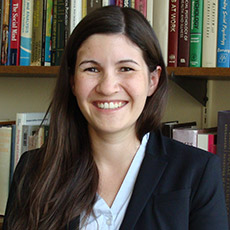Social Area Welcomes Two New Faculty
Jacqueline M. Chen, Ph.D.
 |
|
Jacqueline M. Chen, |
Current Position and Past Achievements:
I am an experimental social psychologist with expertise in social cognition, intergroup relations, and cultural psychology. Before joining the Psychology Department at the U, I was an Assistant Professor at the Department of Psychology and Social Behavior at the University of California, Irvine. I earned my B.A. in Psychology (with distinction) from Pomona College and my Ph.D. in Social Psychology from the University of California, Santa Barbara. I completed my post-doctoral training at the University of California, Davis as a Chancellor’s Post-doctoral Fellow, where I received the Dean’s Award for Research Excellence.
I serve on the editorial board for Social Psychological and Personality Science and Social Cognition and review grants for the National Science Foundation. I am also a co-organizer of the annual Person Memory Interest Group Meeting.
Current Research:
My current research examines the psychological processes engaged in diverse social interactions. In general, I am interested in how social group memberships, such as race and gender, influence the various stages of social interaction, from categorization to impression formation to social support.
What do you like most about your work:
I love social psychology for its ability to answer important questions using rigorous experimentation and empirical evidence. Any question that you’ve asked about human nature – from a superficial musing about why people are interested in watching reality television to deeper questions about the seemingly pervasive and resilient racial, political, and economic divides in modern society – can be answered using social psychological research methods. I love teaching students about previous social psychological findings and working with them to test unanswered questions of their own!
Selected Publications:
Chen, J.M., & Norman, J.B. (2016). Toward a comprehensive understanding of the factors underlying multiracial person perception. Analysis of Social Issues and Public Policy.
Chen, J.M., Kim, H.S., Sherman, D.K., & Hashimoto, T. (2015). Culture and social support provision: The importance of relationship quality.Personality and Social Psychology Bulletin, 41, 1575-1589.
Hamilton, D.L., Chen, J.M., Ko, D.M., Winczewski, L., Banerji, I., & Thurston, J. (2015). Sowing the seeds of stereotypes: Spontaneous trait inferences about groups.Journal of Personality and Social Psychology, 109, 569-588.
Chen, J.M., & Ratliff, K.A. (2015). Implicit attitude generalization from Black to Black-White Biracial group members.Social Psychological and Personality Science, 6, 544-550.
Chen, J.M., & Hamilton, D.L. (2015). Understanding diversity: The importance of social acceptance.Personality and Social Psychology Bulletin, 41, 586-598.
Carpinella, C.M., Chen, J.M., Hamilton, D.L., & Johnson, K.L. (2015). Gendered facial cues influence race categorizations.Personality and Social Psychology Bulletin, 41, 405-419.
Chen, J.M., & Moons, W.G. (2015). They won’t listen to me: Anticipated power and women’s disinterest in male-dominated domains.Group Processes & Intergroup Relations, 18, 116-128.
Samantha Joel, Ph.D.
 |
|
Samantha Joel, |
Current Position and Past Achievements:
I completed my PhD in Psychology at the University of Toronto in 2015. From 2015 to 2016 I was a Postdoctoral Fellow in Human Development and Family Sciences at the University of Texas, Austin. I received a Dissertation Award from the International Association for Relationship Research in 2016.
Current Research:
My research involves studying how people make decisions about their romantic relationships. For example, what sort of factors do people take into consideration when they choose whether to agree to a first date, whether to commit to a new romantic partner, or whether to end a struggling relationship? When people navigate relationship turning points such as these, they are choosing who they ultimately wind up with, if anyone, as a long-term romantic partner. What are the processes through which people make these important decisions, and how might people make better decisions?
I have argued that romantic relationships can be conceptualized as a judgment and decision making (JDM) domain. That is, when people make decisions about their romantic relationships, they rely on many of the same decision strategies that have already been uncovered by research on other kinds of decisions, such as finances, careers, or consumerism. In my research, I borrow concepts, theory, and techniques from the field of JDM to better understand how people make relationship decisions. From a theoretical perspective, my main goal is to identify ways in which relationship decisions are similar to other types of decisions, as well as ways in which they might be unique. From a practical perspective, I hope that this line of work will ultimately be useful for helping people to improve their own relationship outcomes.
What I like most about my work at the University of Utah:
What excites me most about this work is that it is a brand new research area. Despite the wealth of data on how important relationships are for health and well-being (shout-out to Bert Uchino, Tim Smith, and Ed Diener!), the field of psychology has only just begun to explore how people make choices in this area of their lives. I can’t wait to start collaborating with the talented faculty and students here at the U, and see what we can discover about this fascinating topic!
Selected Publications:
Robinson, J. S., Joel, S., & Plaks, J. E (2015). Empathy for the group versus indifference toward the victim: Effects of anxious and avoidant attachment on moral judgment. Journal of Experimental Social Psychology, 56, 139-152.
Day, L. C., Muise, A., Joel, S., & Impett, E. A. (2015). To do it or not to do it? How communally motivated people navigate sexual interdependence
dilemmas.Personality and Social Psychology Bulletin, 41, 791-804.
Joel, S., Teper, R., & MacDonald, G. (2014). People overestimate their willingness to reject potential romantic partners by overlooking
their concern for others.Psychological Science, 25, 2233-2240.
Joel, S., MacDonald, G., & Plaks, J. E. (2013). Romantic relationships conceptualized as a judgment and decision-making domain. Current Directions in Psychological Science, 22, 461-465.
Spielmann, S. S., MacDonald, G., Maxwell, J. A., Joel, S., Peragine, D., Muise, A., & Impett, E. A. (2013). Settling for less out of fear of being single.Journal of Personality and Social Psychology, 105, 1049-1073.
Joel, S., Gordon, A. M., Impett, E. A., MacDonald, G., & Keltner, D. (2013). The things you do for me: Perceptions of a romantic partner’s investments promote
gratitude and commitment.Personality and Social Psychology Bulletin, 39, 1333-1345.
Joel, S., MacDonald, G., & Plaks, J. E. (2012). Attachment anxiety uniquely predicts regret proneness in close relationship contexts.Social Psychological and Personality Science, 3, 348-355.
